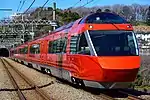| Odakyu 4000 series | |
|---|---|
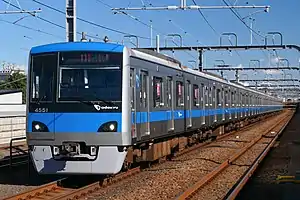 | |
| Manufacturer | Tokyu Car Corporation, J-TREC, JR East[1] |
| Built at | Yokohama, Niitsu |
| Replaced | Odakyu 1000 series |
| Constructed | 2007–2016 |
| Entered service | 22 September 2007 |
| Number built | 160 vehicles (16 sets) |
| Number in service | 160 vehicles (16 sets) (as of 10 February 2023) |
| Formation | 10-car sets |
| Fleet numbers | 4051–4066 |
| Operators | Odakyu Electric Railway |
| Depots | Kitami |
| Lines served | |
| Specifications | |
| Car body construction | Stainless steel |
| Car length | 20 m (65 ft 7 in) |
| Doors | 4 pairs per side |
| Maximum speed | 100 km/h (62 mph)[1] |
| Traction system | Variable frequency (IGBT) |
| Power output | 190 kW per motor[1] |
| Acceleration | 3.3 km/(h⋅s) (2.1 mph/s)[1] |
| Deceleration | 4.0 km/(h⋅s) (2.5 mph/s) (service) 4.7 km/(h⋅s) (2.9 mph/s) (emergency) |
| Electric system(s) | 1,500 V DC Overhead lines |
| Current collector(s) | Pantograph |
| Braking system(s) | Regenerative brake |
| Safety system(s) | OM-ATS, CS-ATC |
| Track gauge | 1,067 mm (3 ft 6 in) |
The Odakyu 4000 series (小田急4000形, Odakyū 4000-gata) is a 1,500 V DC commuter electric multiple unit (EMU) train type operated by the private railway operator Odakyu Electric Railway in Japan since 2007.[2]
Design
The trains are based on the JR East E233-2000 series narrow-body EMU design to permit subway running.[2] The traction motors are fully enclosed to reduce environmental noise.[2]
Formation
As of 1 April 2016, 15 ten-car sets are in service, numbered 4051 to 4065, and formed as follows.[3]
| Car No. | 1 | 2 | 3 | 4 | 5 | 6 | 7 | 8 | 9 | 10 |
|---|---|---|---|---|---|---|---|---|---|---|
| Designation | Tc2 | M6 | M5 | T2 | T1 | M4 | M3 | M2 | M1 | Tc1 |
| Numbering | 4550 | 4500 | 4400 | 4450 | 4350 | 4300 | 4200 | 4100 | 4000 | 4050 |
Interior
Passenger accommodation consists of longitudinal bench seating throughout. Cars 1 and 10 have wheelchair spaces.[3]
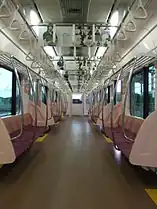 Interior view
Interior view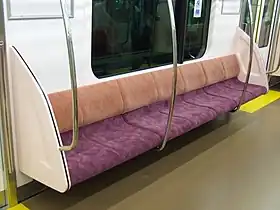 Seating
Seating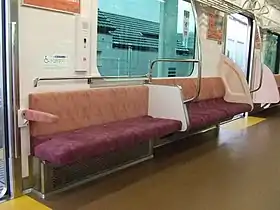 Tip-up seat for wheelchair space
Tip-up seat for wheelchair space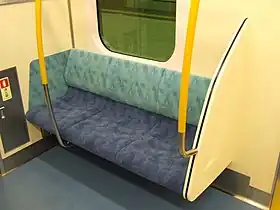 Priority seating
Priority seating
History
The first train was delivered in May 2007, and the trains entered service in September 2007 on inter-running services between Odakyu and the Tokyo Metro Chiyoda Line, displacing 1000 series sets,[4] which were cascaded to surface lines to replace older 5000 and 5200 series sets.
From 26 March 2016, the 4000 series began operation on the JR East Joban Line.[5]
References
- 1 2 3 4 首都圏鉄道完全ガイド 主要私鉄編 [Tokyo Area Complete Railway Guide - Major Private Lines] (in Japanese). Japan: Futabasha. 22 July 2013. p. 20. ISBN 978-4-575-45387-4.
- 1 2 3 私鉄車両年鑑2013 [Japan Private Railways Annual 2013] (in Japanese). Tokyo, Japan: Ikaros Publications Ltd. 20 March 2013. p. 189. ISBN 978-4-86320-693-9.
- 1 2 3 4 私鉄車両編成表 2016 [Private Railway Rolling Stock Formations - 2016] (in Japanese). Japan: Kotsu Shimbunsha. 25 July 2016. p. 59. ISBN 978-4-330-70116-5.
- ↑ "地下鉄に乗り入れなくなった関東大手私鉄車両 想定しながら乗り入れてない車両まで6選" [6 major private railway vehicles in Kanto that can no longer enter the subway]. Traffic News (in Japanese). 20 March 2021. p. 1. Retrieved 12 April 2022.
- ↑ "E233系2000番台・小田急4000形の3社直通運転開始" [E233-2000 series and Odakyu 4000 series now interoperate on three lines]. Japan Railfan Magazine Online (in Japanese). Japan: Koyusha Co., Ltd. 27 March 2016. Retrieved 12 April 2022.
External links
- Odakyu Press Release (5 February 2007). Retrieved on 13 October 2009. (in Japanese)
